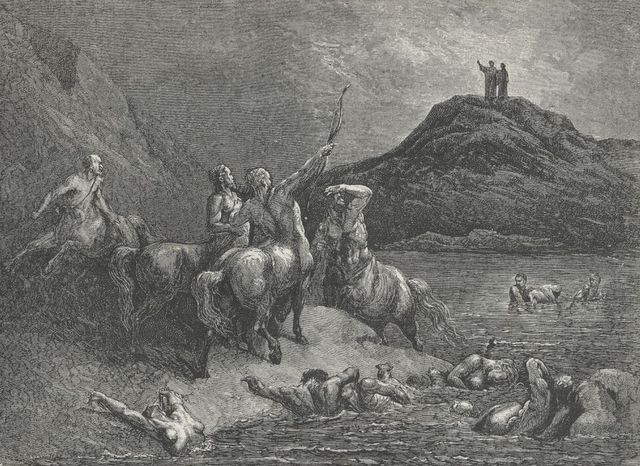E’ Arrivato Flegetonte Posted by Serena on Jul 9, 2015 in Culture, News
“E’ arrivato Flegetonte” (Phlegethon has arrived) is the main headline in most Italian newspapers at the moment. But what on earth is a Flegetonte? Well, in Greek mythology, Phlegethon was one of the rivers of the underworld, its name meaning ‘flaming’. In his Inferno, Dante Alighieri describes the Flegetonte as a river of boiling blood which flows through the Seventh Circle of Hell. The souls of those who have committed violent crimes against their fellow men are immersed in the boiling bloody waters (Inferno, Canto XII, 46-48):
Ma ficca li occhi a valle, che’ s’approccia
la riviera del sangue in la qual bolle
qual che per violenza in altrui noccia
So, has Phlegethon suddenly emerged from the underworld to punish our violent crimes? I wish it were so! Flegetonte is the name given to the ferocious heat wave that is raging here in Italy and parts of Europe, making so many of us suffer (see Geoff’s recent post)
Using names from Greek and Roman mythology or history to describe weather phenomena is quite a new thing here in Italy. In fact it was started as recently as 2012 by the meteorologist Antonio Sanò who, fascinated by the well established system of naming hurricanes in the North Atlantic and Pacific areas, believed that giving names to heat waves and so on would help people to pay more attention to weather alerts. He initially began by giving the name Lucy to a late cold front (after Lucy van Pelts, a cartoon character), followed by Maddalena for a new cold front. But the names that he choose weren’t particularly memorable and, therefore, not very popular with the general public.
Then Scipione arrived! Scipione was the name given by Sanò to the first big heat wave that arrived from North Africa in summer of 2012. The name was taken from the Roman general Publius Cornelius Scipio Africanus, better known as Scipione l’Africano (Scipio the African). In 202 b.C. Scipio defeated Hannibal at the battle of Zama, near Carthage in North Africa, putting an end to the Second Punic War. This famous historical name caught the imagination of the media, and immediately became popular. Since then we have been presented with a series of mythological and historical figures, mostly dark and violent bringers of destruction, such as Annibale (Hannibal) Nerone (Nero), Caligola (Caligula) and Caronte (Caron).
Sanò decided to use male names for heat waves and female names for cold waves. For example, in September 2012 we had the cold wave Poppea (Poppaea Sabina, second wife of the emperor Nero), in 2013 Cleopatra and in 2014 Medea.
So how successful are these names in helping the public avoid the perils of extreme weather conditions? Well, it’s hard to tell, but a neighbour recently told me that he had to take his elderly mother to the Pronto Soccorso (A&E Department) as she was suffering from the effects of Flegetonte. Whilst my neighbour was in the hospital between midday until one a.m. the following morning, at least a hundred locals were admitted, most of them suffering from the heat.

Build vocabulary, practice pronunciation, and more with Transparent Language Online. Available anytime, anywhere, on any device.






Comments:
Nathan:
Hi Serena,
Do you have any particular resources or recommendations to help those of us who have a pretty solid grasp of Italian (reading magazines, newspapers, internet posts in Italian, etc) and who would love to read Dante in the original?
As you probably know, being able to read an English magazine and being able to appreciate Shakespeare (or even really good contemporary English literature) are two different things! Is the same true for Italian?
I’d love to read Dante and I Promessi Sposi in Italian, having enjoyed both in translation for years.
Thanks (and try to keep cool!)
Serena:
@Nathan Salve Nathan, leggere i Promessi Sposi nella lingua originale è possibile anche se in certi punti possono esserci delle difficoltà perché la lingua in oltre 150 anni si è evoluta ovviamente. Ma leggere Dante, se non si è un filologo è moto difficile, perché il toscano del 1200-1300 è molto diverso dall’italiano moderno. Inoltre i Promessi Sposi sono scritti in prosa, mentre la Divina Commedia è un poema, con tutte le licenze linguistiche che la poesia consente. Comunque non ti voglio scoraggiare, ma ti consiglio di usare un testo scolastico, con molte note e spiegazioni. Ai miei tempi erano popolari le edizioni di Natalino Sapegno e del Marchese. Ma non sono aggiornata su nuove edizioni. In bocca al lupo!
Saluti da Serena
Phil:
Ciao Serena,
Una piccolissima correzione. Chiamiamo gli urgani (hurricanes) in gli Stati Uniti. Non diamo un nome a i tornadi (lo stesso).
Phil
Serena:
@Phil Salve Phil, grazie per la correzione, non sono un’esperta meteorologa, tanto meno per l’America 🙂 Provvedo subito ad emendare il testo.
Saluti da Serena
paolo:
(uragani)
Negli stati uniti (e forse nel resto del mondo), gli effetti di cambiamento climatico non sono presi abbastanza seriamente e questo è riflesso nei nomi che noi diamo alle grandi tempeste: Bill, Fred, Dolly, Earl, Paula, ecc… come se loro fossero dei vecchi amici facendo una visita e un”spot of tea”.
Ma non penso che altri nomi come quelli da mitologia greca sarebbero più efficaci negli stati uniti. Forse qualcosa più drammatico come quelli dai film americani e giapponesi : DARTH VADER, GIGANTIS, TERMINATOR, MOTHRA, TRON, GORGO.
Serena:
@paolo Salve Paolo, interessante idea quella dei nomi di film: “è arrivato Terminator!” Però ad usare un nome così si rischia che tutti corrano fuori a vedere Terminator piuttosto che mettersi al sicuro 🙂
Saluti da Serena
Nathan:
Grazie mille Serena!
paolo:
Se qualcuno voglia a correre fuori a vedere “Terminator” cioè qualsiasi tempesta pericoloso, lui merita le conseguenze. (Dico “lui” perché sarebbe un maschile molto probabile.)